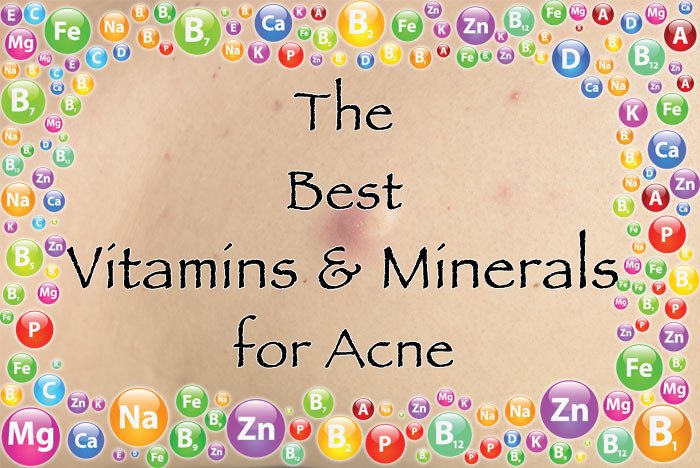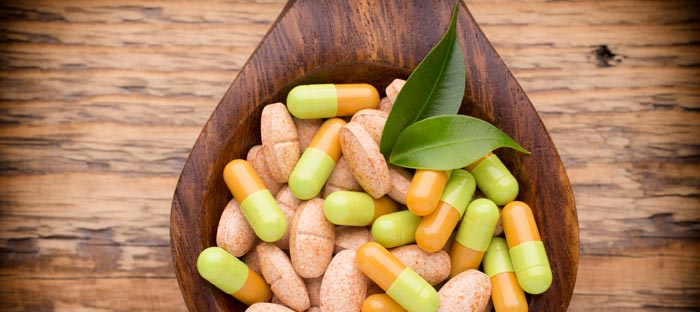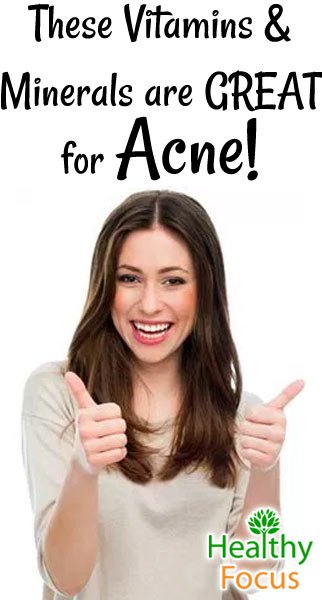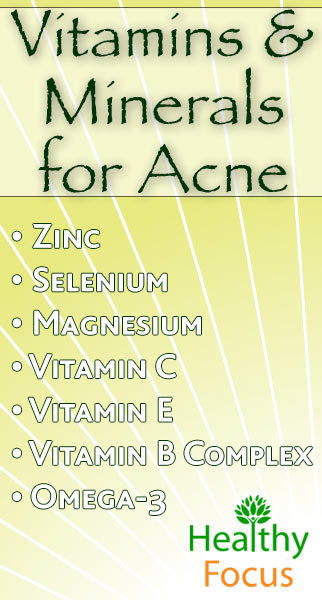Last Updated on April 8, 2018 by Marc Seward

Acne is a common skin complaint that occurs when your pores become clogged with oil and old, dead skin. Most of us have probably suffered from acne at some point during our lives. Very few people will get through their teenage years without an outbreak developing at some point in time.
While acne is more common during your teens, some people are not so fortunate and it can continue into adulthood. Many forms of acne are mild and cause no real problems; indeed some people see the condition as part of growing up, however severe forms of acne can be painful and embarrassing covering large parts of the body including the face, back and chest.
Many people opt for acne skin products to get their condition under control but it is also important to recognize the important role that vitamins and minerals can play in treating your symptoms.
Getting the correct vitamins and minerals in sufficient quantities can do wonders for the health of your skin. Being deficient in these vitamins can put the health of your skin at risk and make it more prone to acne breakouts.
When I was a teenager, food like chocolate and pizza were blamed for acne but these days is understood to be both hereditary and linked to hormonal changes. While eating the bad stuff might not make your acne any worse, making sure that you get the right vitamins from the good stuff like fruit and vegetables might well help.
It is always best practice to try and get your mineral and vitamin dose from your daily diet but if that proves difficult, then supplements are available to plug the gap. If you do need to take supplements, then it is always a good idea to speak to a medical expert especially if you are taking any other medication and worried about interactions.
Vitamins and Minerals for Acne
1. Zinc
Experts are not unanimous on the reasons that it works, but getting sufficient amounts of zinc certainly seems to help subdue acne breakouts and it is considered to be one of the most important vitamins in acne prevention. Zinc is believed to promote regeneration of cells and cell growth and it also helps our bodies to absorb vitamin A which is another essential vitamin for skin health.
Zinc is found naturally in many food products including oysters, beef, pork, dark turkey, lima beans, sesame seeds and pumpkin seeds. The recommended daily dose of zinc is 11mgs for men and 8 for women but for acne treatment recommended doses are much higher in the region of 40 to 60 mgs.
To achieve a sufficient intake of zinc to treat your acne, you will probably need to take supplements but make sure that you speak to your doctor first. Zinc in very high doses taken long term can prove toxic.
2. Selenium
This essential mineral occurs naturally in the body and is present in a trace amount however a deficiency in selenium is thought to be a contributory factor in many cases of acne. Selenium supports thyroid function and works together with vitamin E to boost the immune system and decrease inflammation in the body.
The majority of people should derive sufficient amounts of selenium from their regular diets but selenium deficiency can occur. Deficiency is more common in smokers, women taking oral contraception and those with certain pre-existing medical conditions.
The best dietary source of selenium includes nuts especially brazil nuts and almonds. In fact a single brazil nut eaten daily should provide you with enough selenium. Other good natural sources of selenium are mushrooms, eggs, seafood, poultry and onions.
3. Magnesium
Magnesium is believed to play an important role in skin health in general and acne in particular. Magnesium helps reduce inflammation of the skin and helps balance the hormones, both of which are contributory factors in acne breakouts.
Magnesium is absorbed by the body better when taken in conjunction with vitamin C; on the other hand zinc supplements might prevent it from being properly absorbed into the system.
Try to get your magnesium allowance from a healthy diet including leafy greens, broccoli, squash, pumpkin seeds and fish. If you find it difficult to get enough dark leafy veg into your regular diet, try throwing some of them into your juice recipe.

4. Vitamin C
The importance of antioxidants is well understood and vitamin C is a potent natural antioxidant that can help repair cellular damage, prevent illness and boost our immune systems. A healthy immune system can improve your skin’s health as well as preventing and even healing acne.
Scientists who studied the diets of teenagers on the Kitavan Islands off the coast of New Guinea were impressed to find not a single case of acne. The diets of these teenagers were especially healthy and full of fruit and vegetables while being much lower in refined food like sugars and flour.
Of course, there may be other factors at work, but it is likely that the diets of these teenage islanders played a significant role in the health of their skin.
Most fruit and veg will contain high quantities of vitamin C but some of the richest sources are bell peppers, papaya, mango, strawberries, broccoli, cantaloupe, broccoli and kale.
Despite the well acknowledged importance of fruit and vegetables in our diets, many of us fail to get near the recommended daily amounts. Before you consider supplements, try juicing which is an easy and effective way to ensure that you increase your vitamin C intake.
5. Vitamin E
Vitamin E is another antioxidant considered to be important for skin health and acne prevention. Vitamin E not only helps treat acne but protects the skin from oxidative stress which is responsible for wrinkles and other signs of aging. Vitamin E can be applied topically and is a common ingredient in many skin care products.
As with the other vitamins listed here, you should try to get your vitamin E from a dietary source which includes spinach, papaya, blueberries, almonds and sunflower seeds. If you need to take supplements, be sure that you get food based vitamin E supplements as opposed to petroleum based. The oil from vitamin E capsules can also be applied topically o help treat acne pocks and scars.
6. Vitamin B Complex
A group of eight nutrients (B 1,2,3,5,6,7,9 and 12) make up the B complex vitamins. They help convert carbs, protein and fat into energy, assist digestion, promote liver function and improve immunity.
This combination of nutrients is considered by many to be essential in preserving the health of your skin as well as other major organs and body functions.
B vitamins are well distributed throughout the food groups so a balanced and healthy diet should mean that you receive an adequate supply of these important vitamins.
7. Omega-3 fatty acids
While neither a vitamin nor a mineral, omega-3 deserves a mention on any discussion about acne treatment. Evidence suggests that acne is less common in those consuming diets with a high omega-3 content.
This is due to the anti-inflammatory actions produced by omega-3 acids which nullify some of the inflammatory damage caused by omega-6 acids. Unfortunately the standard modern western diet is balanced too far towards omega-6 fatty acids and nutritionists recommend we get more omega-3 from sources such as salmon, sardines, walnuts and flaxseed. Not only will this improve the health of your skin but it can also keep your heart healthy.
If you suffer from acne, it might be worth looking at your diet to see where it might be lacking. A few dietary changes to ensure that you are getting the necessary amount of these important nutrients might make a difference.

Leave a Reply
You must be logged in to post a comment.